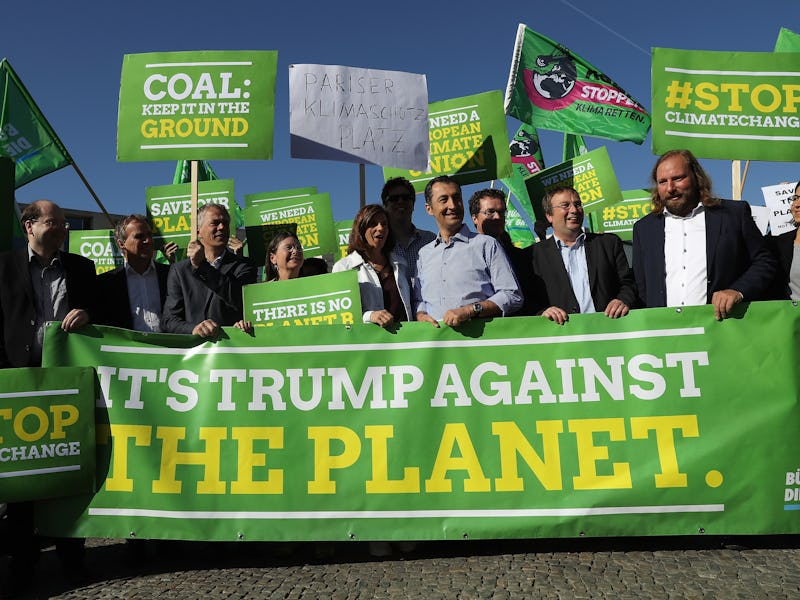What U.S. Withdrawal From Paris Accord Really Means for the Planet
We can't lose sight of the bigger issues threatening climate change mitigation.

By Nives Dolsak; Aseem Prakash, University of Washington
The Trump administration has announced the U.S. will withdraw from the Paris Agreement on climate change. Should we expect any substantive effect on global climate efforts or changes to other U.S. climate policies?
Some suggest there will be additional emissions of up to three billion metric tons of carbon dioxide in the air a year. Others point to higher U.S. emissions due to potentially diluted auto fuel efficiency standards and changes to rules to restrict methane leaks from the oil and gas industry.
To be sure, the decision to pull the U.S. out of a global agreement is a dramatic one. But we suggest that this withdrawal is a symbolic action with little substantive impact on climate mitigation.
As such, it is critical not to overreact and lose sight of domestic issues that could significantly jeopardize future climate policies.
How to Assess the Impact?
To assess the impact of Trump’s decision, the questions we need to ask are the following: First, will new policies be enacted after the withdrawal that will significantly alter carbon emissions? Even before today’s announcement, the Trump administration has indicated plans to cut back on regulations, such as the CAFE auto fuel efficiency and methane rules.
Second, will this withdrawal alter the efforts of China, India or the EU in the realm of renewable energy? Or, for that matter, the states of California and Washington and the businesses that have openly argued for the U.S. to honor the Paris Agreement?
We suggest subjecting the Paris withdrawal to the “additionality” principle: that is, identify the additional impact of Paris withdrawal on climate policy over and above the existing policy trajectory. We would argue that based on the Trump administration’s actions since taking office, pulling out of the Paris climate agreement only reinforces existing actions, rather than leads to a radically new path.
Since its inauguration, the Trump administration has acquired a reputation for hostility to environmental issues. There have been severe cuts to the EPA’s budget, the Clean Power Plan has been discontinued, the Dakota Access and Keystone pipelines have been given the go-ahead and public lands have been opened up to extractive industries.
In other words, the administration had already adopted anti-climate mitigation policies prior to the withdrawal from the Paris Agreement. And so we can expect all actors, be they foreign governments, state governments or businesses, to already have adjusted their expectations about climate change policy compared to the previous administration.
If the Obama administration had withdrawn from Paris, it would have been unexpected and therefore different. But withdrawal by Trump does not provide any new information to other governments and businesses. And so it will not cause them to revise their assessment of how federal government will act on climate change.
Even before announcing plans to pull out of the Paris Agreement, the Trump administration had pushed fossil fuels by approving the Dakota Access and Keystone pipelines and sought to roll back environmental protections.
Will the World Look Different?
So will this withdrawal derail global efforts toward climate mitigation?
China has already emerged a leader in several renewable energy areas, particularly solar and wind. It now has a commercial imperative to move more aggressively given that a growing percentage of new global electricity generation capacity is based on renewable sources. At the same time, China faces severe domestic air pollution problems due to its reliance on coal for electricity generation. Thus, China has strong incentives, both commercial and environmental, to continue its focus on renewable energy.
A similar logic, to some extent, holds for the EU and India. The bottom line is that U.S. withdrawal will probably not change the uptake of renewable energy in other countries.
Red States’ Support
Closer to home, might this decision affect domestic efforts toward climate mitigation? Within the U.S., much of environmental policy innovation is taking place at the state and city level. Withdrawal from Paris does not change these dynamics in climate leaders such as California or Washington.
Some Republicans governors, such as Sam Brownback of Kansas and John Kasich of Ohio, have already become strong supporters of wind energy due to economic benefits it brings to their states. Many policymakers recognize that the decline of coal is due to technological factors resulting in cheap natural gas, and not regulations. In fact, in Wyoming, the largest coal-producing state, wind power is coming to the rescue of some coal communities. In fact, this withdrawal may energize some governors and mayors to become even more aggressive in the area of climate change mitigation.
Importantly, many large businesses support climate change mitigation. The recent open letter by leading CEOs is a case in point. One reason for supporting climate policy is that most businesses are now transnational and have incentives to develop policies that are acceptable across the world. They want a predictable and stable policy environment.
In sum, it is important not to overreact to withdrawal from the Paris Agreement. Instead, pro-environment groups should focus their attention on domestic policy issues by encouraging governors and businesses to move aggressively on climate mitigation. For instance, they should be prepared to fight if the federal government seeks to revoke California’s ability to set higher auto emissions standards, which could greatly change emission policy dynamics. These are the sort of issues people concerned with climate change need to worry about.
Nives Dolsak, Professor of Environmental Policy; Aseem Prakash, Walker Family Professor and Founding Director, Center for Environmental Politics, University of Washington
This article was originally published on The Conversation. Read the original article.